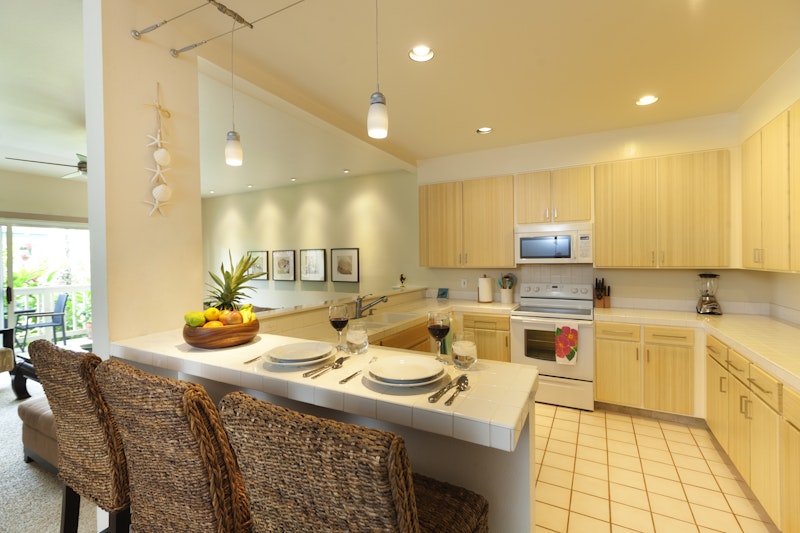The “condo lifestyle” can be appealing in many ways, especially in Hawaii. Here are ten helpful tips as you work to find the perfect one for you!

Ultra-cool amenities, such as pools, tennis courts, gym facilities, even upscale perks like restaurants and spas, and great locations for a fraction of the price of a single-family home - these are just some of the many characteristics that make up the best parts of the “condo lifestyle.” When buying a condo in the beautiful islands of Hawaii, you can also include almost daily sunshine, breezy evenings and spectacular ocean views to this already amazing list!
The advantages of condo living — lower costs, less maintenance and more amenities — make downsizing and up-scaling appealing to many. It’s no wonder why so many neighbors, friends and family are hanging up their rakes, ditching the yard work and saying goodbye to home repairs and chores that eat up their weekends and saying aloha to then more-relaxing, less-stress ownership of a condo! But making the move to buy a condo in Hawaii, and doing your research on what’s for sale, also includes some additional adjustments, such as paying a monthly maintenance fee and having to comply with the condo’s house rules and policies.
Partnering with a knowledgeable, trusted real estate agent is a must — as two heads are always better than one, and your experienced agent will guide you through the pros and cons of each particular condo you consider — likely pointing out things you might otherwise miss. The seasoned condo shopper knows what to look for and what to ask. But if you’re new to the game, especially in Hawaii, this guide will help to get you started.
#1 - What’s the difference between a condo (or condominium) and an apartment?
It’s fairly common for people use the words condo and apartment interchangeably. While the two may look very similar from the outside, there’s actually a big difference between the two. Apartments are buildings that contain multiple living spaces available for rent. Usually, a leasing office or management company is responsible for the entire building and community. Apartment units also cannot be purchased. Condos, however, are buildings that also contain multiple living spaces, but each unit or space is owned individually. Additionally, in almost all cases, they also come with maintenance fees (which we’ll cover below) and other responsibilities not usually associated with apartment buildings.
#2 - What are the condo’s amenities?
For a growing segment of the real estate market, downsizing from a single-family home to a condo is a great way to have it all. Amenities are often the deal makers and include everything from pools and tennis courts, tothe fancier ammenties, like the sand-bottomed pool at the Beach Villas in Ko Olina, the biometric fingerprint elevators that open to your own floor at The Pinnacle downtown, or even accommodations for your four-legged family members, like the private dog park at the Allure Waikiki.

Depending on your lifestyle, you could go splashy or you could go basic, all for a cost — not just in the purchase price, but also in the monthly maintenance fee. When searching for a condo for sale, always ask your agent for a complete list of amenities available for owners and tenants, as this list will play a big role in making your final decision.
#3 - What is the building’s maintenance fee?
As you search for the perfect condo, you’ll notice the wide choice and degree of amenities — but these perks do come with a price. There are monthly fees each owner is responsible for to enjoy these special perks and for general upkeep of most common spaces throughout the property.
When you buy into a condo project, you are buying a single unit and a percentage of the grounds or common areas. The exterior of your unit, along with all the amenities and general upkeep of all the common spaces — like parking garages, elevators, general repairs and scheduled maintenance — are paid for by the homeowners association with funds collected from the monthly maintenance fees.
Fees can range from a couple hundred dollars a month to more than a couple thousand, depending on the range of amenities, the age of the building and how well managed the homeowners association is. One of the most important tips we can provide is doing your homework and incorporating the cost of your maintenance fees into your overall monthly budget.
Your maintenance fee may also work in your favor, especially if available building amenities allow you to forgo expenses elsewhere, like saving on a gym membership. However, not all maintenance fees are created equally. Work with your agent and ask which utilities are included in the maintenance fee. Sometimes, the fee will include electricity, water, sewer and cable. Those are expenses you would normally have to pay for anyway and are part of the overall affordability equation.
#4 - When was the condo built?

When it comes to buying, age definitely matters, especially in Hawaii. Older buildings may have more maintenance and upkeep issues, like replacing elevators, pipes and safety systems, that can drive up the maintenance fees. Newer buildings usually don’t have the maintenance issues/repairs that older buildings have, but may still be steep, depending on what kind of amenities are included. Compare monthly fees with other similar buildings — those that seem either too low or too high could be red flags. With the help of your Realtor®, take a look at the association’s budget, especially noting the reserves they have on hand to deal with replacing or repairing aging building components.
#5 - Are there any actions or decisions by the homeowners’ association that I need to know about?
With the help of your agent, be sure to ask for a copy of the latest information from the homeowners’ association and board of directors. The information, commonly referred to as “condo documents,” will provide you with valuable information and ensure that there are no surprises after you’ve closed.
As an example, when homeowners associations encounter unexpected repairs, they have the option of issuing a special assessment — a charge to each homeowner — in addition to the maintenance fee. Assessments can last for a couple of months or for several years, so you don’t want to learn about this additional monthly cost after you have closed. Big-ticket repairs such as elevators, roofs and lanai railings can deplete condo reserve funds and end up resulting in an assessment to the homeowners, especially in older buildings. Also, remember to ask about any current or pending special assessments during your condo-buying process.
#6 - What kind of restrictions and rules should I be aware of?
Before buying, be sure to request a copy of the “house rules” or a list of policies and guidelines that all need to abide by. There could be constraints on renting out your unit, conducting a home business or making renovations, and rules about parking and amenity use. As part of any condominium purchase, your agent will obtain a copy of the condo’s house rules, by-laws, covenants, and restrictions. Be sure to read all the documents carefully and ask your agent for help understanding anything that may be unclear.
#7 - Which condos are pet friendly?
Your pet is a member of your family and you don’t want to leave them behind! If you have a dog or a cat, remember to check if the building allows pets. Even pet-friendly buildings may have restrictions on the number, type, size and weight of the pet. Rules about pets occasionally change, so it’s best to read the covenants and restrictions and other condo documents to be sure you can accommodate your four-legged friends. It’s also important to compare pet amenities, if available, during your condo-buying process. With Hawaii’s sunny weather, an outdoor pet relief area might be something to consider!
#8 - Can I obtain financing to purchase my Hawaii condo?
If you’re planning to take out a loan to make your purchase, you’ll want to check with your lender to ensure the particular condo meets their lending requirements. Most banks won’t lend if a building is involved in ongoing litigation or another serious concern.
If you are planning on applying for a government loan program, such as a Veterans Administration (VA) or Federal Housing Administration (FHA) loan, verify that the building has been VA or FHA approved before making an offer. Not all condos meet the minimum owner-occupant ratios. Some banks will require a larger down payment for condominium units purchased as rental-income investments. Also, buying a leasehold property may affect the term of your loan, depending on the term of the lease. Check with your lender.
#9 - Do all condos come with parking? How about parking or laundry facilities?
Condos in Hawaii can be small, and some may not include a washer and dryer (in the unit or on-site) or parking. Condo hotels may not even have a kitchen — these are sometimes referred to as lodging units. Your Realtor® will help to make you aware of these nuances and guide your decision. If parking is included, check out the parking stall, especially if you have an oversized truck or a boat, as parking stalls can vary in size. Additional parking may be available for a fee. Working with a knowledgeable Realtor® can help to ensure that you’re not surprised after making your purchase.
#10 - What is a condotel or condo-hotel?
Condotels are found primarily in Waikiki. A condotel is an individual hotel room that a hotel offers for sale as a condominium unit. These units are normally purchased as rentals. Condotels are typically 200 to 300 square feet, often with no parking and no kitchen.

The condotel trend in Hawaii began in the early 2000s, with the hotel-to-condo conversion of the Diamond Head Beach Hotel. Others now include the Ohana Ala Wai Towers, Aston Waikiki Beachside, Aston Waikiki Parkside, Bamboo Hotel, Kuhio Village and The Ala Moana Hotel. Condotel prices are generally lower because of their small size, and are good for motivated first-time investors.
Find out what restrictions, if any, there are in renting out your condo-hotel unit. Some condo-hotel owners opt to rent their units in a hotel pool, while others prefer the security of a long-term tenant or to manage the property themselves. Some banks won’t lend for condo-hotels or will require a larger down payment for this type of unit. Check with your lender to see if they lend on condotel units.
Always Ask Questions
Whether you are looking for an inexpensive starter home or a luxury penthouse suite, the Hawaii condo market offers a broad range of prices, amenities and locations to fit most buyers’ needs. The best advice we can provide: ask questions. Your agent will work on your behalf to find that right fit for you and your needs, from dorm-sized condo hotels for students looking to live it up on a budget, to lavish, luxury suites for those seeking prime real estate in paradise. Regardless of your wishlist, there is a perfect condo on the market, waiting for you to call it home!










